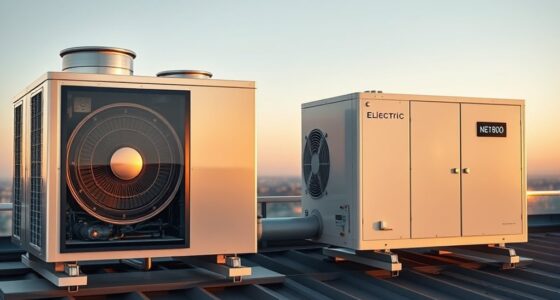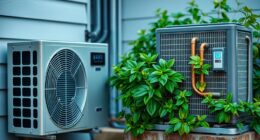We’ve discovered the answer to cutting down on energy use: heat pumps. These incredible machines do a fantastic job by effectively moving heat from one area to another.
In this article, we’ll delve into the basics of heat pumps, how they work, the different types available, and the benefits they bring.
Get ready to discover how heat pumps can save you money and energy, while still keeping you comfortable. Let’s dive in and explore the world of heat pumps together!
Key Takeaways
- Heat pumps are highly efficient heating and cooling systems that transfer heat from one place to another using a small amount of energy.
- Heat pumps have a lower environmental impact compared to traditional heating and cooling systems, reducing carbon emissions by up to 70%.
- Heat pumps are energy efficient and result in significant energy savings, lowering monthly utility bills.
- Choosing heat pumps contributes to a more sustainable future by harnessing renewable energy sources and reducing greenhouse gas emissions.
The Basics of Heat Pumps
As we delve into the basics of heat pumps, let’s start by understanding how they work. Heat pumps are highly efficient heating and cooling systems that transfer heat from one place to another using a small amount of energy.
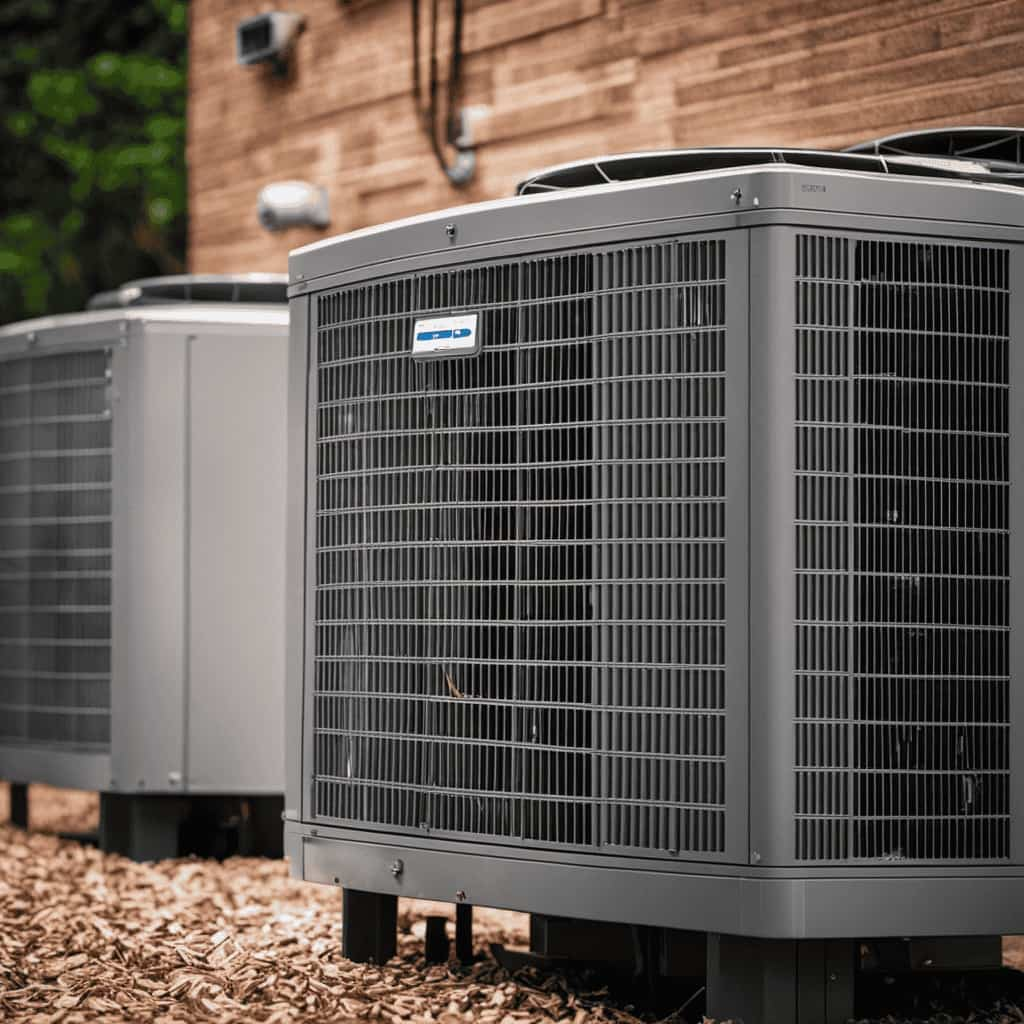
The key advantage of heat pumps is their ability to provide both heating and cooling, making them versatile and cost-effective solutions for both residential and commercial spaces.
Heat pump efficiency is measured by the Coefficient of Performance (COP), which compares the amount of heat produced to the amount of electricity consumed. The higher the COP, the more efficient the heat pump.
Modern heat pumps have achieved COP values of 3 to 5, meaning they produce 3 to 5 times more heat energy than the electricity they consume. This high efficiency results in significant energy savings and reduced utility bills, making heat pumps an eco-friendly choice for serving others and reducing environmental impact.
How Heat Pumps Work
We will now explore how heat pumps work, using a small amount of energy to transfer heat from one place to another. Heat pumps take advantage of the fact that heat naturally flows from areas of high temperature to areas of low temperature. Here is how they accomplish this:
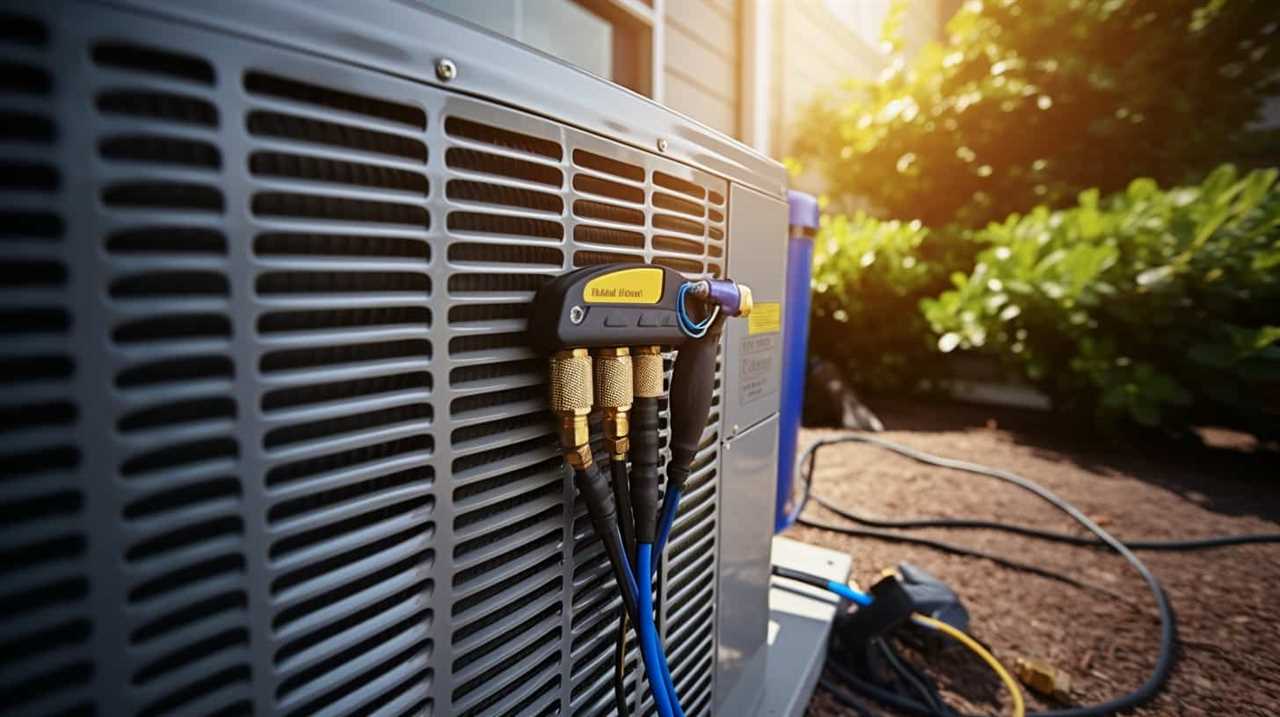
Evaporator: The heat pump’s evaporator coil absorbs heat from the surrounding air or ground.
Compressor: The absorbed heat is compressed, increasing its temperature and energy level.
Condenser: The hot, high-energy refrigerant passes through the condenser coil, releasing heat into the desired space.
Expansion valve: The refrigerant then goes through an expansion valve, which lowers its temperature and pressure, readying it to absorb more heat.

Advantages of heat pumps include high energy efficiency, lower operating costs, and the ability to provide both heating and cooling. However, some disadvantages include the need for supplemental heating in extremely cold climates and the initial high cost of installation.
Types of Heat Pumps
Let’s now explore the different types of heat pumps available in the market, which can greatly vary in terms of their efficiency and applications. Heat pumps utilize different technologies to transfer heat from one place to another, and each technology has its own advantages and disadvantages. Here are three common types of heat pumps:
| Type of Heat Pump | Technology | Energy Efficiency |
|---|---|---|
| Air Source | Transfers heat between the indoor and outdoor air. | Moderately efficient, typically achieving a coefficient of performance (COP) of 2-4. |
| Ground Source | Utilizes the stable temperature of the ground to transfer heat. | Highly efficient, often achieving a COP of 3-6. |
| Water Source | Extracts heat from a water source, such as a well, lake, or river. | Efficient and versatile, with a COP ranging from 2-5. |
Benefits of Heat Pumps
When considering the benefits of heat pumps, we find that they offer a cost-effective energy solution for both residential and commercial applications.
By utilizing renewable energy sources, such as air or ground, heat pumps can significantly reduce energy consumption and lower utility bills.

Additionally, heat pumps contribute to a greener environment by reducing carbon emissions, making them an environmentally friendly choice for heating and cooling systems.
Cost-Effective Energy Solution
Heat pumps are truly an incredibly cost-effective energy solution for homeowners. They not only provide efficient heating and cooling, but also offer several benefits that make them a worthwhile investment. Here are some reasons why heat pumps are a cost-effective choice:
Energy Efficiency: Heat pumps use energy efficient technology to transfer heat from one place to another, resulting in significant energy savings compared to traditional heating and cooling systems.
Lower Utility Bills: By reducing energy consumption, heat pumps can lower your monthly utility bills, helping you save money in the long run.

Environmental Impact: Heat pumps have a lower environmental impact compared to conventional heating and cooling methods, as they use renewable energy sources and produce fewer greenhouse gas emissions.
Increased Home Value: Installing a heat pump can increase the value of your home, making it a wise financial decision.
With their cost-effectiveness and numerous benefits, heat pumps are an excellent choice for homeowners looking to reduce their carbon emissions and save on energy costs.
Reduced Carbon Emissions
As homeowners, we can significantly reduce our carbon emissions by choosing heat pumps, which not only provide efficient heating and cooling but also offer several environmental benefits.
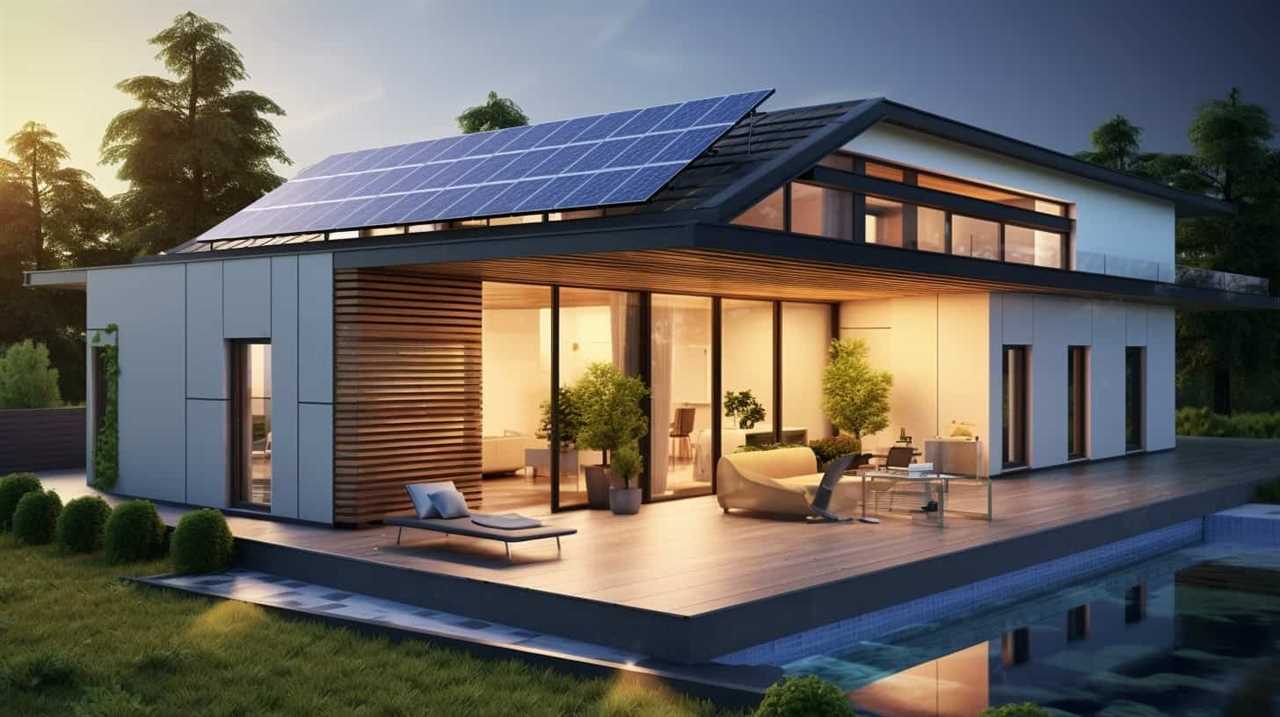
Heat pumps are a type of renewable energy source that transfer heat from one place to another, rather than generating heat directly. By harnessing the heat from the air or ground, heat pumps can produce up to three times more energy than they consume. This means that they’ve a much lower environmental impact compared to traditional heating and cooling systems.
In fact, heat pumps can reduce carbon emissions by up to 70% compared to gas or oil boilers. By opting for heat pumps, we can play an active role in combating climate change and creating a more sustainable future.
Energy Savings With Heat Pumps
Heat pumps offer a cost-effective energy solution while also reducing our carbon footprint. By efficiently transferring heat from the air or ground, heat pumps can provide both heating and cooling for residential and commercial spaces.
This not only helps to lower energy consumption and utility bills but also decreases the reliance on fossil fuels, leading to a more sustainable and environmentally friendly future.

Cost-Effective Energy Solution
We can achieve significant energy savings with heat pumps, making them a cost-effective solution for reducing our overall energy consumption. By utilizing heat pumps, we can reap the following benefits:
Reduced electricity bills: Heat pumps are highly efficient, converting a single unit of electricity into three to five units of heat energy, resulting in lower energy costs.
Minimal environmental impact: Heat pumps are environmentally friendly, as they extract heat from the air, ground, or water, rather than burning fossil fuels, reducing greenhouse gas emissions and air pollution.
Long lifespan: Heat pumps have a longer lifespan compared to traditional heating systems, reducing the need for frequent replacements and resulting in cost savings over time.
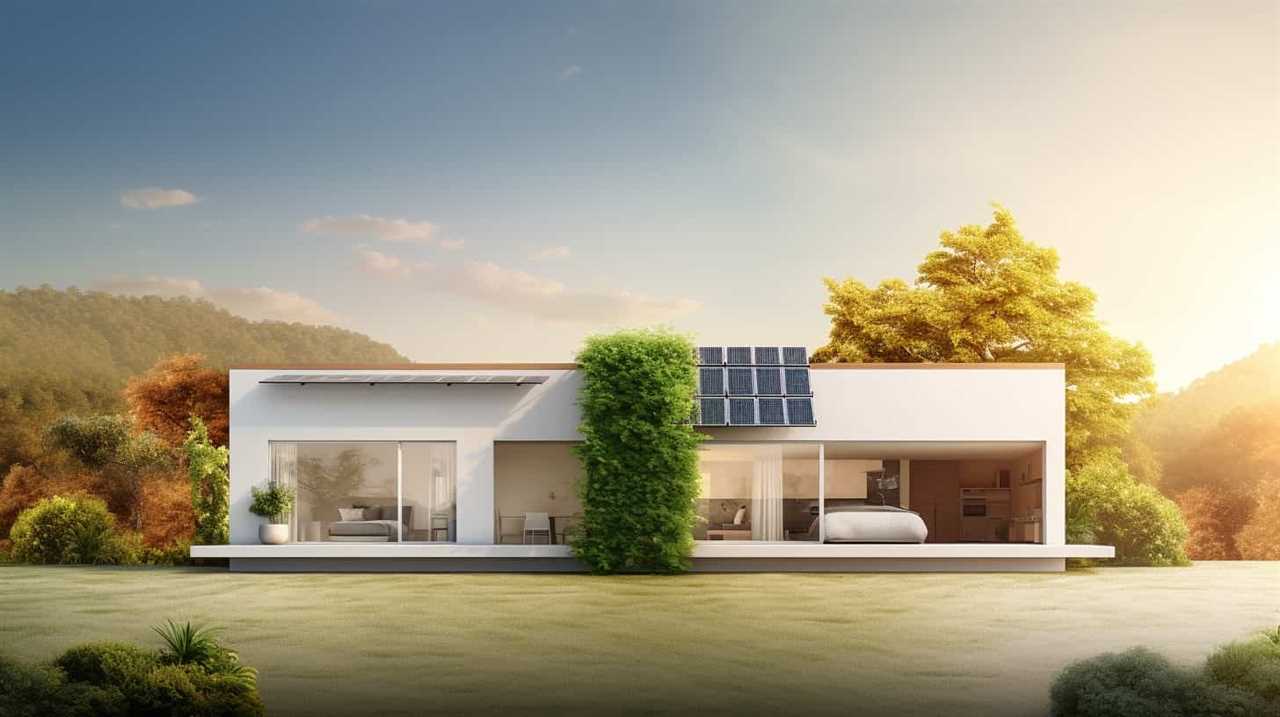
Government incentives: Many governments offer financial incentives, such as tax credits and subsidies, to promote the use of heat pumps, making them an even more cost-effective solution.
With their cost-effectiveness and positive environmental impact, heat pumps are an excellent choice for reducing energy consumption.
Reducing Carbon Footprint
By utilizing heat pumps, we can significantly reduce our carbon footprint and contribute to a more sustainable future. Heat pumps are energy efficient appliances that use renewable energy sources to provide heating and cooling for homes and buildings. Compared to traditional heating and cooling systems, heat pumps consume less energy and produce fewer greenhouse gas emissions. This makes them an excellent choice for individuals and households who are conscious about reducing their impact on the environment.
To better understand the environmental benefits of heat pumps, let’s take a look at a comparison table:
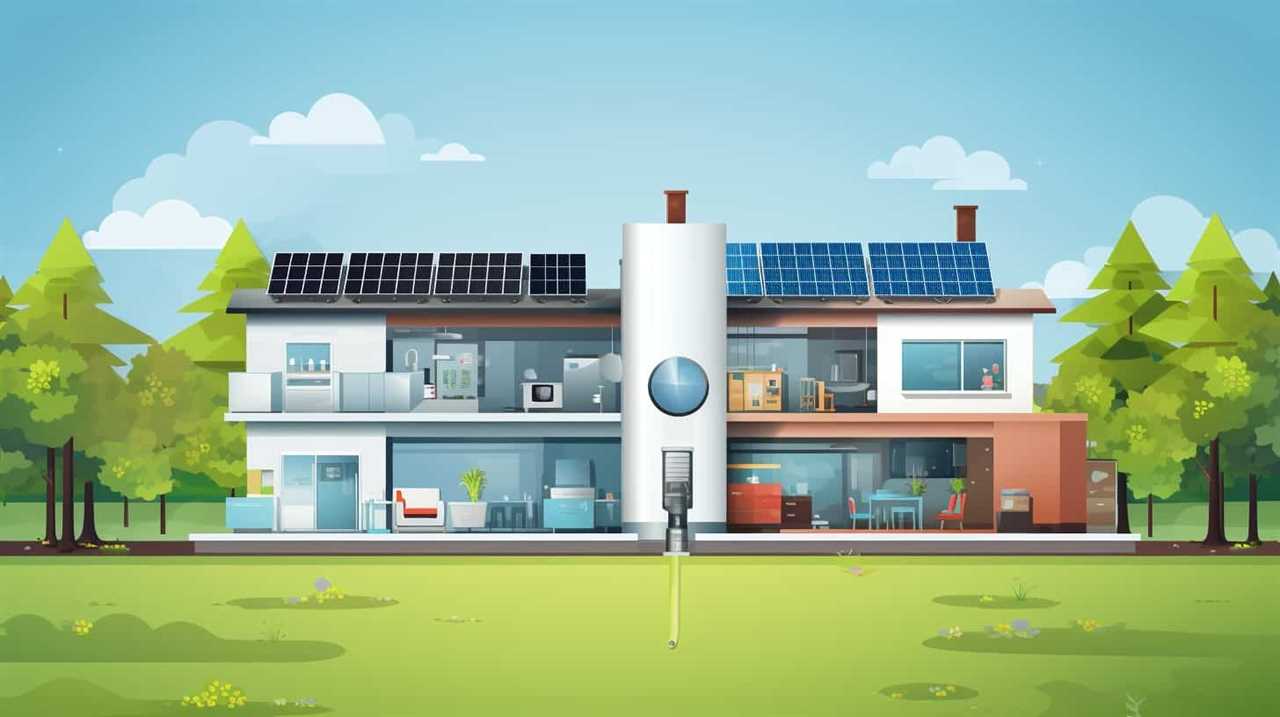
| Heating/Cooling System | Energy Efficiency Rating | Carbon Footprint |
|---|---|---|
| Heat Pump | High | Low |
| Gas Furnace | Moderate | Moderate |
| Electric Resistance Heater | Low | High |
As shown in the table, heat pumps have a high energy efficiency rating and a low carbon footprint, making them a greener choice for heating and cooling.
In the next section, we will discuss considerations for heat pump installation and how to choose the right system for your needs.
Considerations for Heat Pump Installation
Fortunately, there are several important factors to consider when installing a heat pump. These installation considerations are crucial to ensure optimal performance and energy efficiency. Here are some key points to keep in mind:
Location: Choose a suitable location for the heat pump installation, considering factors such as accessibility, noise levels, and clearance requirements.

Sizing: Properly size the heat pump according to the heating and cooling demands of the space to maximize efficiency and avoid over or under-sizing.
Ductwork: Evaluate the condition and design of the existing ductwork, ensuring it’s compatible with the heat pump system.
Recommended maintenance: Regular maintenance is essential for the longevity and efficient operation of your heat pump. Follow the manufacturer’s guidelines for cleaning, filter replacement, and professional servicing.
Maintaining and Troubleshooting Heat Pumps
When it comes to maintaining and troubleshooting heat pumps, it’s important to be proactive and address any issues promptly. Regular maintenance is key to keeping your heat pump running efficiently and avoiding costly repairs. Here are some maintenance tips to keep in mind:

- Clean or replace air filters regularly to ensure good airflow.
- Check the outdoor unit for debris and remove any obstructions.
- Inspect the refrigerant levels and look for any leaks.
- Lubricate the motor and other moving parts to reduce friction.
- Test the thermostat to ensure accurate temperature control.
Despite regular maintenance, there may be some common problems that can occur with heat pumps. These include refrigerant leaks, frozen coils, and electrical issues. If you encounter any of these problems, it’s best to call a professional technician for troubleshooting and repairs.
Transitioning to the next section, it’s important to understand the benefits of heat pumps compared to traditional heating and cooling systems.
Heat Pumps Vs. Traditional Heating and Cooling Systems
As homeowners, we can save energy and reduce our carbon footprint by choosing heat pumps instead of traditional heating and cooling systems. Heat pumps have several advantages over traditional HVAC systems:
Energy Efficiency: Heat pumps transfer heat instead of generating it, resulting in significant energy savings. They can provide up to 4 units of heating or cooling for every unit of electricity consumed.

Year-Round Comfort: Heat pumps can both heat and cool your home, eliminating the need for separate heating and cooling systems. They’re capable of maintaining a consistent and comfortable indoor temperature throughout the year.
Environmental Benefits: By relying on renewable energy sources such as the ground or the air, heat pumps reduce greenhouse gas emissions and contribute to a healthier environment.
Cost Savings: Although heat pumps have a higher upfront cost, their energy efficiency leads to lower utility bills, resulting in long-term savings.
Choosing heat pumps over traditional HVAC systems not only benefits us as homeowners but also helps us contribute to a more sustainable future.

Frequently Asked Questions
Are Heat Pumps Suitable for All Types of Homes and Climates?
Heat pumps are suitable for most homes and climates, but their efficiency and cost effectiveness vary depending on the region. Factors like temperature extremes and energy prices should be considered when determining if a heat pump is the right choice.
How Long Does a Heat Pump Usually Last Before Needing to Be Replaced?
Heat pumps usually last around 15-20 years before needing replacement. Regular heat pump maintenance and prompt repairs can extend their lifespan. Signs of a failing heat pump include reduced heating or cooling capacity, strange noises, and higher energy bills.
Can a Heat Pump Be Used for Both Heating and Cooling Purposes?
Yes, a heat pump can be used for both heating and cooling. This dual functionality is one of the key benefits of using a heat pump. It allows for increased energy efficiency and provides year-round comfort.
Are There Any Government Incentives or Rebates Available for Installing a Heat Pump?
There are government incentives available for installing heat pumps, which can help offset the cost and promote energy efficiency. These incentives encourage individuals to adopt more sustainable heating and cooling solutions.

What Are the Potential Drawbacks or Limitations of Using a Heat Pump Compared to Traditional Heating and Cooling Systems?
Potential drawbacks and limitations of heat pumps compared to traditional heating and cooling systems include higher upfront costs, reliance on electricity, limited effectiveness in extreme climates, and the need for regular maintenance and professional installation.
How Does a Heat Pump Compare to Traditional Heating in Terms of Energy Consumption?
When it comes to energy consumption, a heat pump outperforms traditional heating methods. The use of a heat pump significantly reduces energy consumption, making it a more efficient option. By utilizing the heat from the environment, heat pump energy consumption is notably lower than that of traditional heating systems, resulting in cost savings and a more sustainable choice for heating needs.
Conclusion
In conclusion, heat pumps are an incredible technology that can significantly reduce energy consumption in residential and commercial buildings. By efficiently transferring heat from one area to another, heat pumps provide both heating and cooling capabilities, resulting in considerable energy savings.
With various types of heat pumps available and the numerous benefits they offer, it’s evident that these systems are a superior choice compared to traditional heating and cooling systems. Embracing heat pumps is like unleashing a powerful force that brings ultimate energy efficiency to our spaces.


